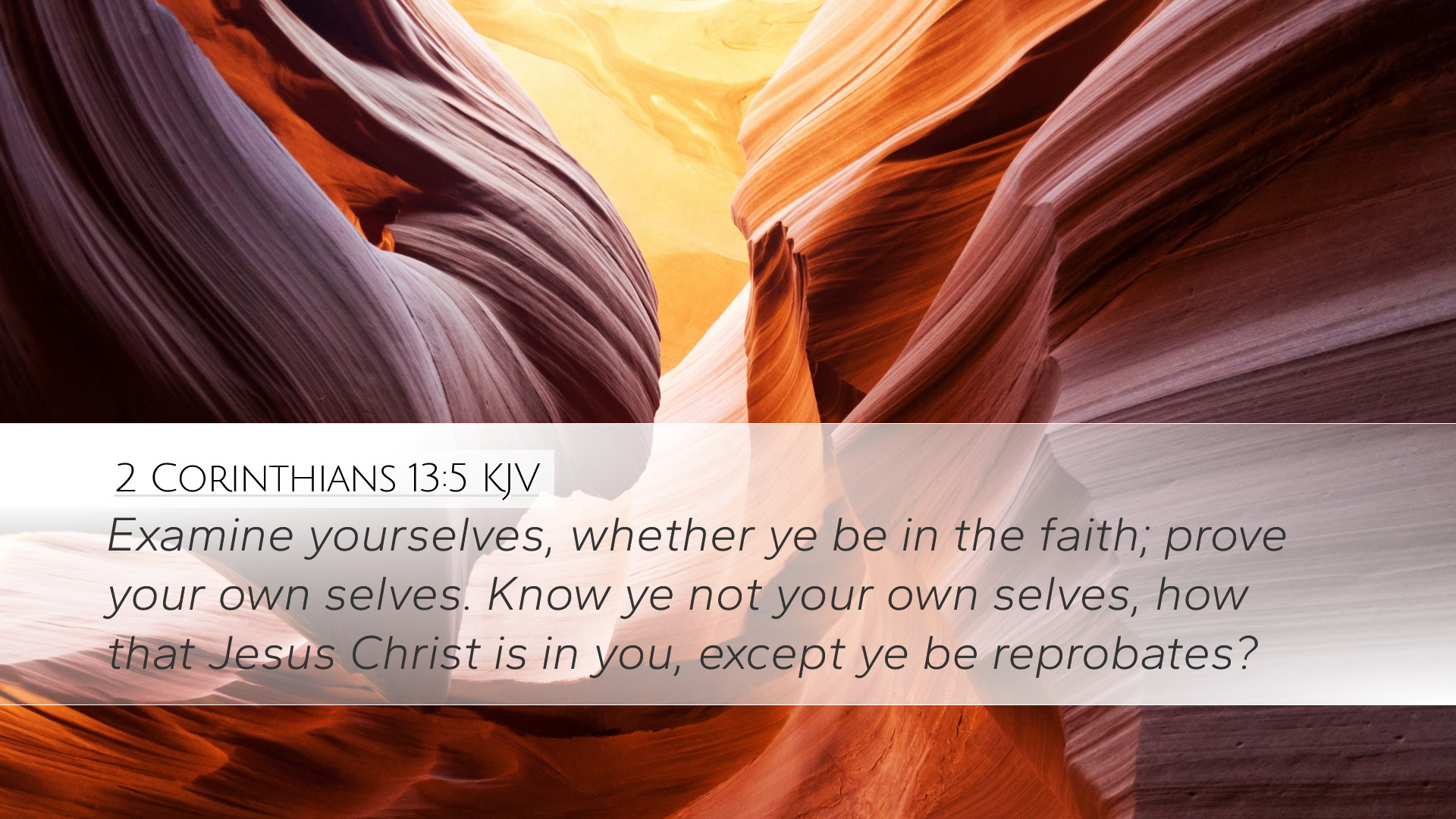Old Testament
Genesis Exodus Leviticus Numbers Deuteronomy Joshua Judges Ruth 1 Samuel 2 Samuel 1 Kings 2 Kings 1 Chronicles 2 Chronicles Ezra Nehemiah Esther Job Psalms Proverbs Ecclesiastes Song of Solomon Isaiah Jeremiah Lamentations Ezekiel Daniel Hosea Joel Amos Obadiah Jonah Micah Nahum Habakkuk Zephaniah Haggai Zechariah Malachi2 Corinthians 13:5
2 Corinthians 13:5 KJV
Examine yourselves, whether ye be in the faith; prove your own selves. Know ye not your own selves, how that Jesus Christ is in you, except ye be reprobates?
2 Corinthians 13:5 Bible Commentary
Commentary on 2 Corinthians 13:5
Verse: "Examine yourselves, whether ye be in the faith; prove your own selves. Know ye not your own selves, how that Jesus Christ is in you, except ye be reprobates?" (2 Corinthians 13:5 KJV)
Introduction
This verse occurs in the closing section of Paul's second letter to the Corinthians, where he aims to prepare them for his impending visit and to address the issues of sin and authenticity within the church. Paul places the responsibility of spiritual integrity upon the believers, urging them to perform an introspective examination of their faith.
Examination of Faith
“Examine yourselves, whether ye be in the faith; prove your own selves.”
Matthew Henry, in his commentary, emphasizes the necessity of self-examination. He argues that a true believer must regularly reflect upon their faith and ensure it aligns with the teachings of Christ. This personal audit is not merely a formality but rather an essential practice to maintain a living relationship with God.
Albert Barnes elaborates on this notion, stating that the phrase “in the faith” refers to the doctrine and belief system that is foundational to Christian practice. He insists that the Corinthians should not only profess faith but must also evaluate the authenticity of their profession. True faith is characterized by a transformative effect in a believer’s life.
Importance of Self-Examination
- Accountability: Self-examination holds believers accountable for their spiritual walk and their adherence to the truth of the gospel.
- Growth: Regular introspection encourages growth in grace and a deeper understanding of one's relationship with Christ.
- Humility: This process cultivates a spirit of humility, allowing individuals to recognize their reliance on God’s grace rather than their own strength.
Knowing Ourselves
“Know ye not your own selves, how that Jesus Christ is in you, except ye be reprobates?”
Adam Clarke offers profound insights regarding the phrase “Jesus Christ is in you.” He points out that the indwelling presence of Christ is a key indicator of a genuine believer. The reality of Christ’s presence within one’s life should manifest in behavior that reflects His character.
Henry further emphasizes the contrast between believers and "reprobates." He defines a reprobate as someone rejected and unworthy, highlighting that those who are in Christ cannot be reprobates. This assurance should inspire confidence in the believer, prompting them to live in light of their identity in Christ.
Consequences of Self-Examination
- Awareness of False Security: Self-examination may reveal areas of complacency or false security that need to be addressed.
- Healing and Restoration: Genuine examination can lead to repentance and the restoration of fellowship with God.
- Preparation for Judgment: It helps prepare believers for the judgment seat of Christ, where they will give account of their lives and faith.
Call to Authenticity
In conclusion, 2 Corinthians 13:5 serves as a powerful call to authenticity within the Christian faith. Pastors, students, and scholars alike must recognize the importance of self-examination not only as a personal obligation but as a communal responsibility. The integrity of the faith community undoubtedly hinges on the individual integrity of its members.
Paul's exhortation practically compels each believer to ensure that their profession of faith is genuine and aligned with the teachings of Jesus. This self-examination should result in a vibrant faith that not only endures but also impacts the wider community for the glory of God.
Final Reflection
As we reflect on this passage, let us earnestly seek to understand and transform our own lives through the examination of our faith. May we not remain as mere observers but engage wholeheartedly in the pursuit of Christ, who strengthens us and enables us to embody the fullness of His Spirit.


